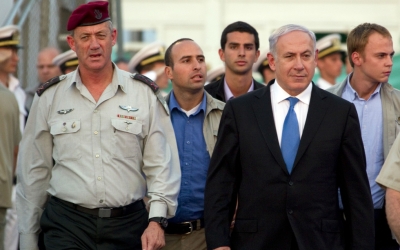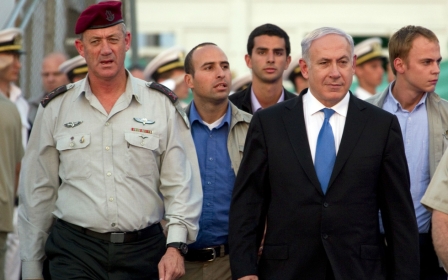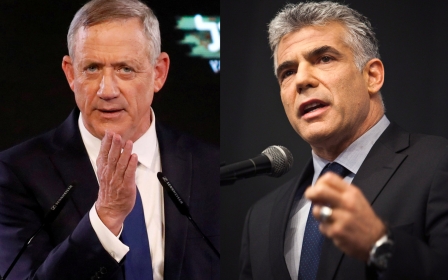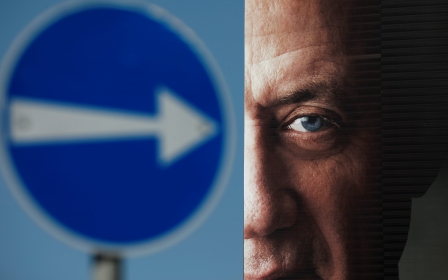Benny Gantz wants to unite Israel. But is his vision too vanilla?
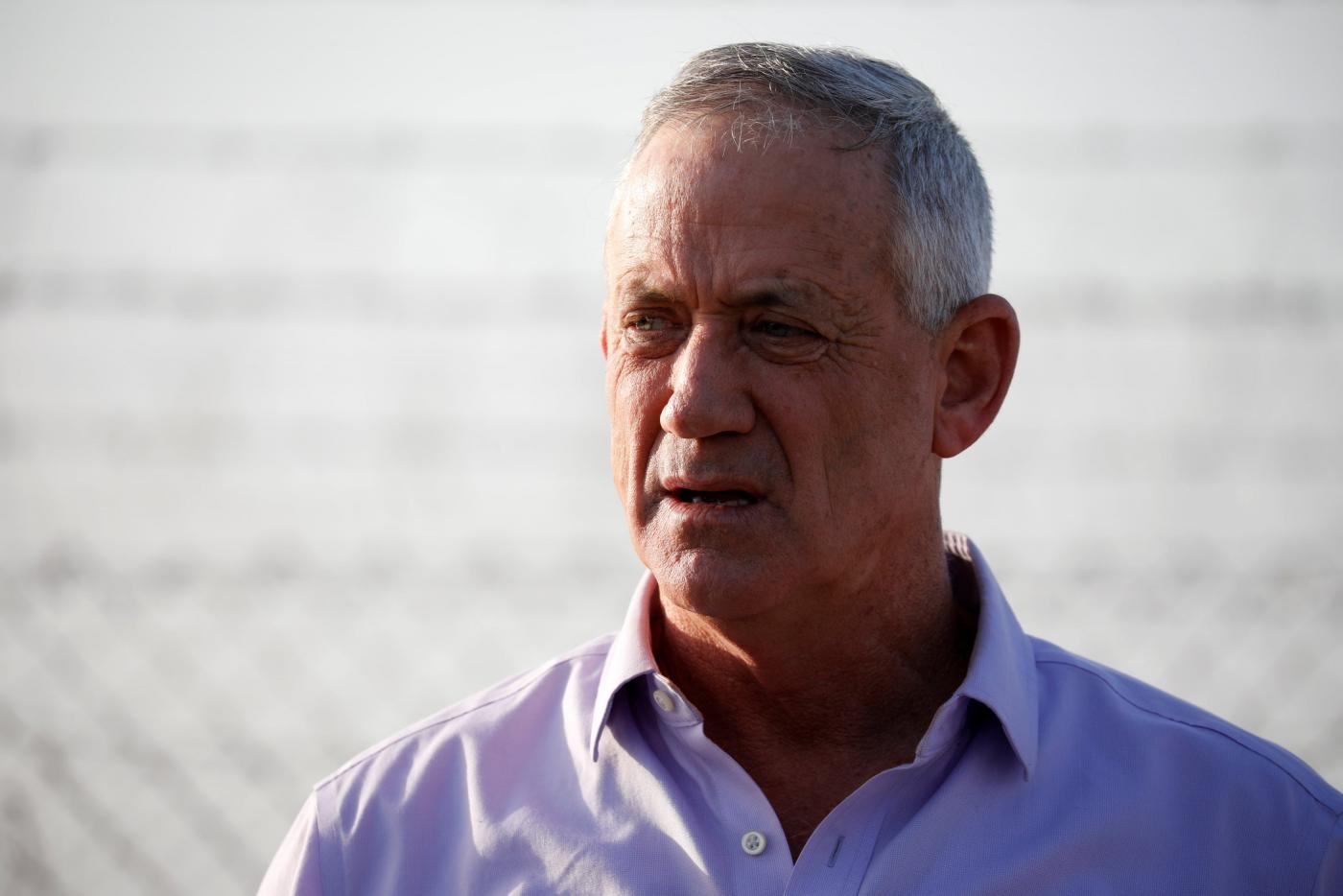
Benny Gantz looks comfortable. He’s swivelling in his chair and cracking jokes.
He looks a lot more comfortable on stage, in a room packed with supporters and inquisitive Israelis, than he does in the polls, at least.
'He needs to show more emotion and show his core values'
- Darren Cohen, a British-Israeli
On Tuesday evening, the former army chief-turned-prime ministerial challenger’s Blue and White party fell behind Benjamin Netanyahu’s Likud in the latest poll, after holding a slender lead throughout the campaign.
New MEE newsletter: Jerusalem Dispatch
Sign up to get the latest insights and analysis on Israel-Palestine, alongside Turkey Unpacked and other MEE newsletters
On top of that, the mathematics isn’t quite working out for him. Netanyahu’s party has a far easier path to forming a coalition that can hold a majority in Israel’s parliament, the Knesset.
Gantz could do it, though. There’s a week left until Israelis cast their votes on 9 April, time in which the large numbers of undecided voters can be pulled over to his camp.
To attract them, he’s hammering home the same line: someone needs to stop Netanyahu.
“He [Netanyahu] served in public life for more than two decades and 13 years as a prime minister,” Gantz told a crowd in Tel Aviv on Tuesday.
“Enough is enough.”
Time to pull together
Gantz, 59, is as self-assured as you’d expect a military general to be.
He’s one of 12 Israeli chiefs of staff to enter politics. Two of them, Moshe Yaalon and Gabi Ashkenazi, are in his party.Gantz hopes to become the third chief of staff to make the transition to prime minister.
Born to Romanian and Hungarian Holocaust survivors, he served in the military from 1977 to 2015, when he stepped down as its commander.
During that period, Gantz provided security for visiting Egyptian President Anwar Sadat, fought in south Lebanon, cracked down on the Second Intifada and waged an indiscriminate war in the Gaza Strip that killed some 2,200 people – over half of them civilians.
His campaign has sought to play up that 2014 conflict, releasing a series of videos celebrating the number of “terrorists” killed under his command and boasting about bombing Gaza back into the stone age. A move considered a misstep in some quarters, where the lauding of Palestinian deaths was criticised as crass and insensitive.
But while Gantz has predictably highlighted his security credentials, his policies and vision are far more opaque.
Unsurprising, perhaps, for someone who only entered politics three months ago and heads an unwieldy alliance of centrist and centre-right figures.
Some of Gantz’s allies might at first glance have little more in common than a desire to oust Netanyahu.
The way the general sees it, however, is that Israel is being pulled in a dangerous direction by politicians who want to chip away at the organs of state in order to achieve their own personal political ends.
“Look at what is happening inside Israel,” Gantz said on Tuesday. “The minister of culture is supposed to develop our own cultural institutions. She attacks them.
"The minister of justice is supposed to support our justice system. She attacks it.
“The security cabinet attacks the IDF and others. The prime minister attacks everyone.”
It’s time, Gantz says, for Israelis to pull together instead.
Stagnant status quo
In that sense, Gantz is an arch-conservative.
And when it comes to Israel’s relations with the Palestinians – a subject tellingly absent from the discourse in this year’s election – he’s circumspect at best on the issue of how to extricate his country from the occupation.
“Only with new leadership on both sides can we eventually move on,” he offered on Tuesday.
In reality, that means a Gantz premiership is likely to see a continuation of the stagnant status quo in the occupied West Bank.
In front of the crowd in Tel Aviv he was clear: “We must maintain the Jordan Valley as our eastern security border, we can’t withdraw to the ’67 lines as we knew them, we have to maintain the blocs of settlements, and Jerusalem will forever stay the united, in practice capital of Israel.”
That said, Gantz was eager to talk up the peace accords and pullbacks that his predecessors made.
The Blue and White leader was the last Israeli soldier to leave southern Lebanon at the end of the 18-year occupation in 2000, he reminded his audience.
In fact, he’s appeared far more comfortable with the idea of speaking to the Palestinian Authority than engaging with the leaders of Hadash-Taal and Balad-Raam.
The two slates representing Palestinian citizens of Israel are polling at six seats and five, respectively, and would make handy numbers in forming a governing coalition.
But that doesn’t look likely to happen.
“While I have nothing against Arab citizens of this country, and I think they are equal citizens, unfortunately their political leaders are talking against the government," Gantz said.
"So while I can serve their citizens, I can’t cooperate politically with their leaders.”
The 'Teflon general'
“It’s been a nasty campaign,” sighed Michal Cababia, a Blue and White campaigner handing out leaflets ahead of Gantz’s event.Faced with a man described as the “Teflon general,” Gantz’s opponents have gone personal.
Reports have emerged that Gantz has sought psychiatric help. He denies that, though his opponents have seized on the allegations to paint him as unfit for office.
“It’s sad that they’ve made a chief of staff that people looked up to into someone unstable,” Cababia said.
Moments later, an Israeli settler told the Blue and White leader that it appeared he suffered from severe paranoia, making Gantz uncharacteristically bristle in anger.
“Let me tell you something else and show you where your leader is taking us… There are people who go to psychiatrists. Who need that treatment. Is it fair to think of them like that?” he replied.
The sight of Gantz momentarily losing his cool hit a chord with the audience.
“He needs to show more emotion and show his core values,” Darren Cohen, a British-Israeli, told Middle East Eye as Gantz left.
Cohen, a self-described “dyed-in-the-wool Labor voter,” said he won’t be voting for Blue and White.
Giving a vote to Yaalon, Netanyahu’s former defence minister and staunch opponent of a Palestinian state, would be too hard.
'We need to fix the house'
And that’s part of Gantz’s problem. How can the general tie together disparate and contradictory Israelis from across the political divide in an effective force?
Urie Salant, a retired biology teacher and undecided voter, worried that trying to appease too many people could lead to the Blue and White movement losing momentum.
“It wasn’t clear that collecting all these broad parties hasn’t resulted in a vision that’s vanilla,” he said.
Gantz has six days to work that out. But even if he doesn’t see an answer, he’s quite clear on the problem.
“Something is wrong and I’m telling you, we need to fix the house,” he said. “It’s an internal emergency.”
Middle East Eye delivers independent and unrivalled coverage and analysis of the Middle East, North Africa and beyond. To learn more about republishing this content and the associated fees, please fill out this form. More about MEE can be found here.




